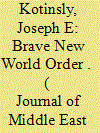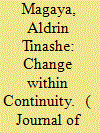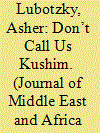|
|
|
Sort Order |
|
|
|
Items / Page
|
|
|
|
|
|
|
| Srl | Item |
| 1 |
ID:
188641


|
|
|
|
|
| Summary/Abstract |
This article uses the history of the Supreme Council for Islamic Revolution in Iraq, the largest Shī‘ī Islamist organization within the exiled Iraqi opposition movement, as a case study to delineate how the meaning, function, and salience of sectarian identities are affected by political and social changes at the local, regional, and international level. To this end, this work identifies and explains a discursive shift observed in SCIRI’s publications produced during its tenure as an Iraqi opposition group. Whereas SCIRI’s publications during the Iran-Iraq War emphasized that its brand of Islamic government would represent all Iraqis regardless of their religious or ethnic affiliation, following the war’s conclusion the Council strove to portray its leaders as the primary defenders of Shī‘ī interests in Iraq and focused near exclusively on the need to protect the rights of Iraq Shī‘ī. It argues that several key developments account for the Supreme Council’s adoption of a Shī‘ī-centric political stance during the 1990s, namely: the internationalization and unification of the Iraqi opposition movement in the aftermath of the 1991 March Uprisings and the post-Cold War environment within which the exiled Iraqi opposition was operating. When considered collectively, beyond demonstrating the contingency and complexity of the advent of Shī‘ī identity politics within Iraqi opposition circles throughout the 1990s, these findings suggest the importance of taking into consideration larger, global trends as contributing factors when conceptualizing how subnational forms of identification acquire heighted social and political salience.
|
|
|
|
|
|
|
|
|
|
|
|
|
|
|
|
| 2 |
ID:
188642


|
|
|
|
|
| Summary/Abstract |
How do bureaucrat-local politician relations affect the inclusiveness of local governance in emerging democracies? This study answers the question through conducting a case study of Tunisia. The study evaluates interview data recently collected among 39 municipalities in socio-economically divergent regions with mayors, city council members, civil society members, and a governor, and examines transparency data compiled for all 350 municipalities by an independent civil society organization. The findings suggest that partisanship appointment of governors can limit the inclusiveness of local governance through perpetuating hierarchical relations with mayors at the expense of inclusive local engagement mechanisms. An analysis on the Transparency Index of municipalities within governorates with identified partisanship ties (n = 206) indicates that municipal governance becomes less transparent when a governor shares a political background similar to the ideological position of the mayor’s party. Thus, partisan appointments of bureaucrats can have implications for the inclusiveness of local governance.
|
|
|
|
|
|
|
|
|
|
|
|
|
|
|
|
| 3 |
ID:
188640


|
|
|
|
|
| Summary/Abstract |
The article examines how a rural community in Bocha, Zimbabwe, molded Christianity to suit and serve its local everyday realities. It highlights the coexistence and interdependence between Christianity and the long-standing Bocha people’s traditions. It contends that although ordinary churchgoers internalized Christian idioms and teachings, they did not give up being the Bocha. In doing so, it highlights how existing ways of socialization, social facts, local beliefs, spiritual needs, and customs shaped the understandings of sacred indigenous and Christian spaces. It argues that an existing pre-Christian tenet of tolerance created the right social environment for religious diversity and the coexistence of indigenous and Christian practices and beliefs. Thus, the article points to the persistence of pre-Christian culture within an increasingly Bocha Christian community in the first half of the twentieth century.
|
|
|
|
|
|
|
|
|
|
|
|
|
|
|
|
| 4 |
ID:
188639


|
|
|
|
|
| Summary/Abstract |
During the 1960s, several hundreds of African students attended long-term academic or vocational programs in Israel. For Israel, offering higher education to Africans was considered a way to strengthen its influence in decolonizing Africa, while for African states, it was a means to gain vital technical expertise and reduce reliance on ex-colonial powers or the Cold War superpowers. African international students, however, were not merely pawns in this larger international political game. Responding to everyday racism and influenced by radical and Pan-Africanist ideas of the turbulent sixties, these students became active participants and commentators within Israeli society. They employed diverse strategies to promote anti-racist and anti-colonial causes, engaging in political activism at levels that were uncommon in the Israeli student social scene. By doing so, African students in Israel contested local prejudices about Africa and Africans and taught the hosting society important lessons on political awareness, broad-mindedness, acceptance, and racial tolerance. This history tells of understudied aspects of the global Black-Jewish relations in the 1960s. It also provides a novel perspective on Israeli society – one that surpasses the well-discussed Jewish-Arab or Ashkenazi-Mizrahi divisions – and contributes to the scholarly understanding of the meanings and manifestations of Blackness in Israel.
|
|
|
|
|
|
|
|
|
|
|
|
|
|
|
|
| 5 |
ID:
188643


|
|
|
|
|
| Summary/Abstract |
This article explains changing patterns in police militarization in the Middle East and North Africa. It presents new data on police forces in nineteen countries in the region, 1946–2020, which demonstrate that police have become more militarized over time – increasingly adopting the weaponry, tactics, and organizational practices of military forces. The authors distinguish between the use of militarized riot squads and tactical units embedded within otherwise civilian police, to which they refer as “militarized civilian policing,” and more-extensively militarized “paramilitary” police. This study argues that while colonial legacies can help explain the ubiquity of paramilitary policing in former French colonies in particular, the increasing use of riot squads and tactical units in more recent decades has been driven in large part by concerns about military intervention in politics, as well as incentives created by international security assistance programs.
|
|
|
|
|
|
|
|
|
|
|
|
|
|
|
|
|
|
|
|
|